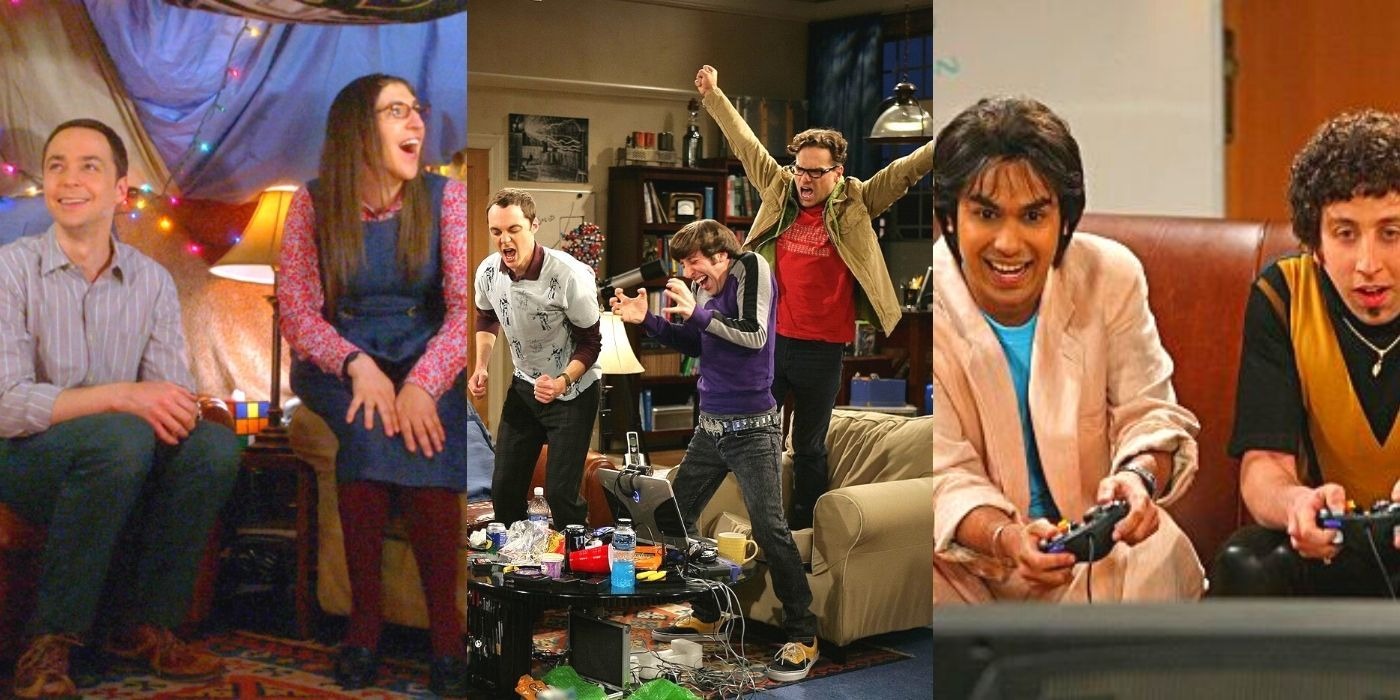
Although The Big Bang Theory had some stellar character writing, the show’s best character arc ironically doomed its hero. The Big Bang Theory’s finale highlighted just how much the show’s priorities had changed throughout its 12 seasons. When the show began, The Big Bang Theory focused primarily on the relationship between Leonard and Penny.
That said, this wasn’t the show’s primary concern in its finale. As critics of The Big Bang Theory’s ending like Vulture’s Kathryn Von Arendonk noted, the show treated Penny’s pregnancy as an afterthought compared to Sheldon’s all-important Nobel Prize acceptance speech. Gradually, Jim Parsons’s scene-stealing character became the true hero of The Big Bang Theory.
The Big Bang Theory Redeemed Howard with His Bernadette Relationship
Howard’s Entire Personality Changed Throughout The Sitcom’s 12 Seasons
This might not seem like a problem on its face. After all, Young Sheldon’s finale was spent setting up its spinoff, Georgie & Mandy’s First Marriage, proving that the spinoff moved on from its title character to focus on a new breakout star, too. However, The Big Bang Theory’s shifting focus spelled trouble for one character.
For the first few seasons, Howard relentlessly pursued an image as a sleazy womanizer.
To see why Leonard’s character arc was so disappointing in The Big Bang Theory, viewers need to remember how unexpectedly strong Howard’s arc was. Howard was the lothario of the sitcom’s central friend group, albeit with most of his romantic conquests taking place inside his mind. For the first few seasons, Howard relentlessly pursued an image as a sleazy womanizer.
Most hang-out shows have a version of this character among their lineup. In The Big Bang Theory’s sitcom universe, it was Howard, in Friends, it was Joey, in How I Met Your Mother, it was Barney, and in New Girl, it was Schmidt. Of course, each of these shows also took a new spin on the theme.
How I Met Your Mother’s Barney could be a loathsome cad, but viewers were encouraged to feel sympathy towards him. Friends’ Joey slept around a lot, but his dim-witted nature made him feel more innocent than predatory. New Girl’s Schmidt was more nakedly insecure, which humanized Max Greenfield’s character considerably.
What made Howard an atypical sitcom lothario was the fact that he almost never successfully wooed any women. He was met with disgust and disdain by most of his potential conquests, including Penny. As such, it wasn’t a major surprise when he changed after entering a relationship with Bernadette. What was surprising was how he changed, and how much.
Howard went from a pretty vile character who once hid a camera in a teddy bear he gifted Penny, to a likable, reliable husband and father. He was a reformed family man by the time the show ended, and some of The Big Bang Theory’s best episodes followed this version of the character. He still had his flaws, but he was a fundamentally different person.
Howard’s Redemption Highlighted The Big Bang Theory’s Biggest Failure
Leonard Never Grew Throughout His Relationship with Penny
From the outside, looking in, this sounds like little more than a well-written character arc. Howard began by embodying one archetype, and by the end of the show, he had grown and changed so much that his old self seemed like an entirely different person. However, this only served to highlight another character’s failings.
One of the main issues with the short-lived Friends spinoff Joey was the complaint that Joey hadn’t changed at all since the original series ended, so his antics felt tired and over-familiar. Similarly, a major problem with Barney’s story in How I Met Your Mother was that most of his promised redemption came in a short montage at the end of the finale.

Viewers only got to know one side of Leonard. Sadly, it was one that was all too unwelcomely familiar to sitcom audiences.
In contrast, viewers got to know and love the new Howard after he changed his ways and fell in love with Bernadette. In contrast, while The Big Bang Theory’s next spinoff promises new versions of the show’s familiar characters, viewers only got to know one side of Leonard. Sadly, it was one that was all too unwelcomely familiar to sitcom audiences.
The show started on Leonard’s side, so, like Ted from How I Met Your Mother or Ross from Friends, he ended up becoming the show’s most toxic character by the finale. Leonard never changed or grew in The Big Bang Theory, since his only aim was to win over Penny, and he achieved this pretty early on.
When Penny seemed glamorous and successful early in the series and Leonard was a nebbish pushover, it was easy for viewers to root for the quiet, seemingly kind character. However, as the show continued, Leonard dated plenty of women, cheated on more than one of them, including Penny, and often ignored the feelings of his romantic partners and friends alike.
The Big Bang Theory’s Focus Shift Made Its Leonard Problem Worse
The Show Centered Sheldon From Season 7 Onward
Leonard did have a tough relationship with his cold mother, but this excuse didn’t cover for his toxic behavior throughout the show’s 12 seasons. While Young Sheldon and Georgie & Mandy’s First Marriage had toxic dynamics of their own, Leonard lied to Penny, cheated on her, dated his friend’s sister, cheated on her too, failed to support Penny’s career, and constantly made fun of her.
Leonard’s bitter streak resulted in him feeling like his character’s flaws were justified by his underdog status, but this excuse evaporated when he got the girl. His growth could have then become the show’s main focus, as it did with Howard, but another factor got in the way of this plan.
The fact that Leonard and Penny found each other was seen as sufficient evidence of their growth, and so the duo’s dynamic remained toxic throughout the show’s remaining seasons.
The Big Bang Theory’s increased focus on Sheldon made Leonard a worse character, as Leonard and Penny’s personalities were effectively locked at the moment they began dating seriously. The fact that they found each other was seen as sufficient evidence of their growth, and so the duo’s dynamic remained toxic throughout the show’s remaining seasons.
Although Penny and Leonard’s worst The Big Bang Theory fights were left unresolved, this was because the show assumed viewers were rooting for them to remain together, no matter how much work they still had to do. As such, The Big Bang Theory’s Howard ironically highlighted just how much the show let down its ostensible leading man’s character development.
